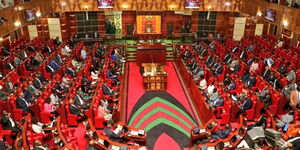The Public Service Commission (PSC) continues to resist the Statute Law (Miscellaneous Amendments) Bill, 2023, which received approval from the National Assembly on March 20, 2024, and now awaits Presidential assent to become law.
This bill, which stripped the Public Service Commission of its powers to employ staff in the Office of the Attorney General, has sparked a contentious debate over the allocation of human resource.
The amendment grants the Attorney General significant powers to appoint officers in his office, including the Deputy Solicitor General, state counsels, and other staff, thereby diminishing the role of the Public Service Commission in matters of recruitment, appointment, promotion, and discipline within AG Muturi's office.
Attorney General Justin Muturi, supported by the Judiciary, Office of The Director of Public Prosecutions (ODPP), and the Law Society of Kenya (LSK), has argued that the structural impediments imposed by the Public Service Commission hinder the efficient operation of his office.
Muturi emphasized the necessity of granting his office autonomy in hiring practices, citing difficulties in recruiting and retaining experienced state counsels.
"The connection with PSC in the employment of staff has never worked well with the Office of the Attorney General," Muturi remarked, highlighting the challenges faced due to poor remuneration and lack of career progression within his office.
However, the PSC remains steadfast in its opposition to the amendments, viewing them as encroachments upon its constitutional mandate to set norms and standards for human resource management in the public service.
Amb. Anthony Muchiri, Chairperson of the Public Service Commission, in a press release on Wednesday, March 27, pointed out what he believes to be the broader implications of the proposed changes on executive authority, accountability, and constitutional responsibility.
"The looming challenge is whether the amendments will stand the test of time without amending the constitution," Muchiri stated, expressing concerns about the potential erosion of the Commission's authority in favour of individual ministries and agencies.
The establishment of an Advisory Board chaired by the Attorney General to oversee employment functions at the AG's office is a central feature of the proposed changes. This board is tasked with advising the Attorney General on matters pertaining to staffing and recruitment.
Despite the Attorney General's assertion of the necessity for autonomy in human resource management, questions linger regarding the balance of power between the Executive, the Attorney General's office, and the Public Service Commission.
Critics argue that the amendments undermine the Commission's role in ensuring efficiency and effectiveness in the public service.
According to the PSC, the broader implications of these amendments raise concerns about the potential for a domino effect across ministries and agencies, challenging the foundational principles of accountability and constitutional adherence.
The proposed changes also entail a significant reorganization within the Office of the Attorney General, potentially altering the status and functions of key positions such as the Solicitor General.
PSC has questioned the appropriate mechanisms for appointment and oversight within the Executive branch.
Central to the debate is the question of whether the AG can maintain independence from the national Executive, particularly concerning appointments and staffing decisions.
The proposed amendments challenge the constitutional framework by redistributing human resource management functions from the PSC to the AG, raising concerns about the separation of powers and institutional autonomy.
Furthermore, PSC argues the amendments alter the recruitment process for key positions within the AG's office, such as the Solicitor General, diminishing the President's and the National Assembly's role in the appointment process.
According to the PSC, the proposed changes could set a precedent for other ministries and agencies to demand similar autonomy, potentially undermining the role of the PSC in overseeing public service appointments.
Moreover, questions have been raised about the composition and mandate of the newly established Advisory Board chaired by the Attorney General, with concerns about its independence and expertise.












